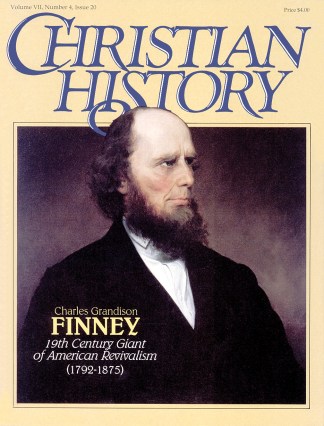Charles Grandison Finney is considered America’s greatest past revivalist. Church rolls swelled in the wake of Finney’s revivals. Though it is hard to gather accurate statistics, he is often directly, or indirectly credited with the conversions of around 500,000 people.
Rochester, New York, was dramatically transformed by his work there in 1830–31 in what has been called the greatest year of spiritual awakening in American history. Shops were closed so people could attend his meetings, and as a result of the changed hearts, the town taverns went out of business. Finney soon won international fame.
George Williams, an English worker, was converted by reading Finney’s writings. In London in 1844, inspired by Finney’s social reform stand, Williams founded the YMCA.
Finney, like most Christians in his day, and his Puritan forebears, was a postmillennialist; he believed that Christ would return after the millennium had come to earth. This was the reason for his efforts at social reform. He believed, like Jonathan Edwards before him, that America was on the threshold of God’s kingdom, and said on various occasions that if only Americans would repent and obey the Lord, the millennium would soon come.
Finney had little formal religious training. He studied in a law office, but left that field before becoming a licensed lawyer. His preaching reflected his legal training and relied on reasoning: He said his task was to present the case for Christ as if a jury would then make a decision.
Early in his career, Finney made it a point to criticize seminary education and scoffed at theology, but later he spent many years as a professor at Oberlin College and wrote two weighty volumes on systematic theology!
Finney was a “Grahamite”—a follower of the popular health advocate Sylvester Graham, who taught that bad eating habits were as “sinful as drinking alchohol.” Oberlin adopted Graham’s ideas, which forbade coffee, tea, tobacco, gravy, most sweets, pepper, oil, vinegar and mustard, and advocated a meatless diet of vegetables, fruits, and grains.
Once when Finney was preaching, a loud crack was heard in the church and a beam fell through the roof. The crowd panicked and amid screaming, many jumped out of a window into a canal. Finney was picked up and carried out—barely able to refrain from laughing.
Years after his revivals, after reflecting on the many who had then claimed conversion but had since fallen away, Finney had mixed thoughts on the genuine results of his work.
Finney devoted great energy in his later years to attacking Freemasonry.
Copyright © 1988 by the author or Christianity Today/Christian History magazine. Click here for reprint information on Christian History.










